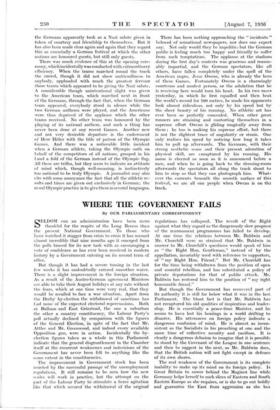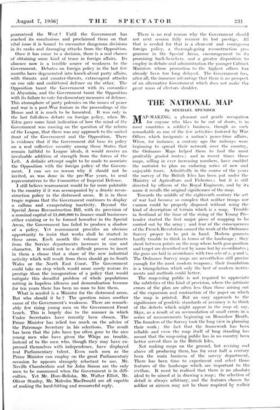WHERE THE GOVERNMENT FAILS
By OUR PARLIAMENTARY CORRESPONDENT
SELDOM can an administration have been more thankful for the respite of the Long Recess than the present National Government. To those who have watched it stagger from crisis to crisis it has seemed almost incredible that nine months ago it emerged from the polls braced for its new task with as encouraging a vote of confidence as has ever been received in modern history by a Government entering on its second term of office.
But though it has had a severe tossing in the last few weeks it has undoubtedly entered smoother water. There is a slight improvement in the foreign situation. As a result of the Austro-German 'agreement Ministers are able to take their August holidays at any rate without the fears, which' at one time were very real, that they would be recalled to face a war situation. Apart from the Derby by-election the withdrawal of sanctions has had none of the expected electoral repercussions. Both at 13alham *and East Grinstead, the one a suburban the other a country constituency, the Labour Party's poll actually declined by comparison with the figures of the General Election, in spite of the fact that Mi. Attlee and Mr. Greenwood, and indeed every available Opposition gun, were in action. Incidentally the by-_ election figures taken as a whole in this Parliament indicate that the general disgruntlement in the Chamber itself at the recurrent weaknesses and indecisions of the Government has never been felt to anything like the same extent in the constituencies.
The improvement 'in" Government stock has been assisted by the successful passage of the unemploYmerit regulations. It still remains to be seen how the new scales will work in practice, but the attempt on the part of the Labour Party to stimulate a "fierce agitation like that which secured the withdra*al Of the -original' regulations has collapsed. The revolt of the. Right against what they regard as the dangerously slow. progress of the rearmament programmes has failed to "develop.' At one time the relations between Mr. Baldwin and Mr. Churchill were so strained that Mr. Baldwin in answer to Mr. Churchill's questions would speak of him as " the Right Hon. Gentleman," instead of by the appellation, invariably used with reference to supporters, of " my Right Hon. Friend." But Mr. Churchill has for the time being withdrawn from the position of open and scornful rebellion, and has substituted a policy of private deputations for that of public attack. Mr. Baldwin has restored him to the position of " ink right honourable friend." But though the Government has recovered part of its authority it is still far belOw what it was in the last Parliament. The blunt fact is that Mr. Baldwin has not recaptured his old qualities of inspiration and leader- ship. He is essentially a peace-tithe MiniSter, and he seems to have lost his bearings in a world drifting to disaster. His utterances on foreign policy indicate dangerous confusion of mind. He is almost as incon- sistent as the SOcialists in his preaching at one and the same °time of ' Collective security and pacifism. It is clearly a dangerous delusion to imagine that it is possible to stand by the Covenant -of the League in one sentence and then to suggest in the next, as Mr. Baldwin does, that the British nation will not fight except in defence , shores. The it own shores. The real Weakness of the Government is its complete inability to make up its mind on its foreign policy. Is Great Britain to cower behind the Maginot line while Germany helps herself to such slices of Eastern and South Eastern EuroPe as she requires, or is she to go out boldly and guarantee the East from aggressiim as she has guaranteed the West ? Until the Government has reached its conclusions and proclaimed them on that vital issue it is bound to encounter dangerous divisions in its ranks and damaging attacks from the Opposition.
Once it has come to a decision, there is a real chance of obtaining some kind of truce in foreign affairs. Its absence now is a terrible source of weakness to the Government. Debates on foreign policy in the last few months have degenerated into knock-about party affairs, with thrusts and counter-thrusts, extravagant attacks on one side and embittered defence on the other. The Opposition taunt the Government with its cowardice in Abyssinia, and the Government taunt the Opposition with its failure to vote for elementary measures of defence. This atmosphere of party polemics on the issues of peace and war is a post-War feature in the proceedings of the House and it is much to be lamented. It was only in the last full-dress debate on foreign policy, when Mr. Eden gave some faint indication of how the mind of the Government was moving on the question of the reform of the League, that there was any approach to the united front of the Government and the Opposition. There is evidence that if the Government did base its policy on a real collective security among those States that remain faithful to League ideals, it would receive an invaluable addition of strength from the forces of the Left. A definite attempt ought to be made to associate the Opposition with the foreign policy of the Govern- ment. I can see no reason why it should not be invited, as was done in the pre-War years, to send representatives to the Committee of Imperial Defence.
I still believe rearmament would be far more palatable to the country if it was accompanied by a drastic recon- struction policy in the distressed areas. It is in these tragic regions that the Government continues to display a callous and exasperating inactivity. Beyond the Special Areas Reconstruction Bill, with its provision of a nominal capital of £1,000,000 to finance small businesses either existing or to be formed hereafter in the Special Areas, the Government has failed to produce a shadow of a policy. Yet rearmament provides an obvious opportunity to insist that works shall be started in those areas. Each month the volume of contracts from the Service departments increases in size and character. It would not be a difficult process to insert in them a clause, that a share of the new industrial activity which will result from them should go to South Wales or the North East Coast. The Government could take no step which would more surely restore its prestige than the inauguration of a policy that would mitigate this dreadful problem of whole populations rotting in hopeless idleness and demoralisation because for ten years there has been no man to hire, them. .
What is needed is a Minister for the distressed areas. But who should it be ? The question raises another cause of the Government's weakness. There are remark- ably few rising young men on the Government Front bench. This is largely due to the manner in which Under Secretaries have recently been chosen. The Prime Minister has relied too much on the advice of the Patronage Secretary in his selections. The result has been that the jobs have too often gone to the nice young men who have given the Whips, no , trouble, instead of to the men who, though they may have ,ex- pressed themselves with independence, have displayed real Parliamentary talent. Even such men as the Prime Minister can employ on the great Parliamentary occasion he appears strangely reluctant to use. Mr. Neville Chamberlain and Sir John Simon are the only men to be summoned when the Government is in diffi- culties. Yet Mr. Hore-Belisha, Mr. Walter Elliot, Mr. Oliver Stanley, Mr. Malcolm MacDonald are all capable of making the hard-hitting and resourceful reply. There is no real reason why the Government should not next session fully recover its lost prestige. All that is needed for that is a clear-cut and courageous foreign policy, a thorough-going reconstruction pro- gramme in the Special Areas, encouragement to its promising back-benchers, and a greater disposition to employ in debate and administration the younger Cabinet Ministers whose promotion to the highest offices has already been too long delayed. The Government has, after all, the immense advantage that there is no prospect of an alternative Government which does not make the great mass of electors shudder.







































 Previous page
Previous page